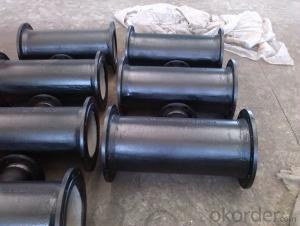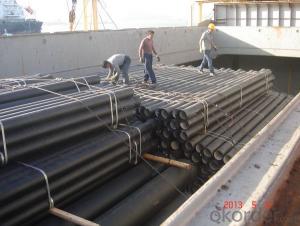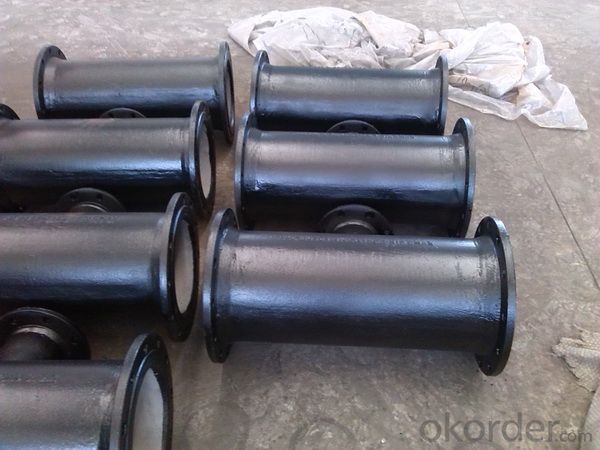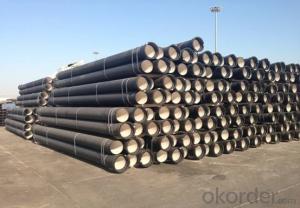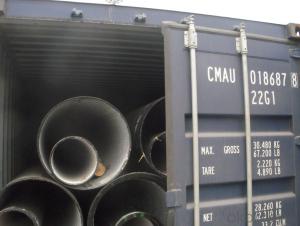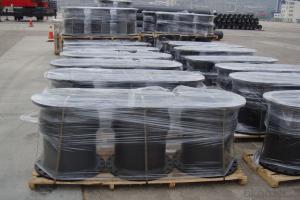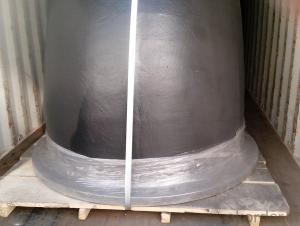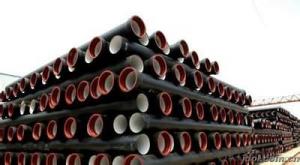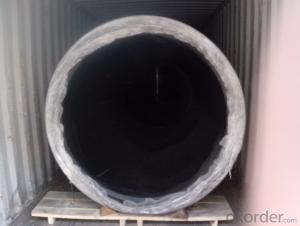DUCTILE IRON PIPE C Class DN 1600
- Loading Port:
- Tianjin
- Payment Terms:
- TT OR LC
- Min Order Qty:
- -
- Supply Capability:
- 30000Tons m/month
OKorder Service Pledge
OKorder Financial Service
You Might Also Like
CNBM ductile iron pipe ranges from DN80-DN1600mm (T-Type, Class K9), effective length 6m, comply with ISO2531 Standard
Company Profile
CNBM International Corporation is the leading production base and renowned supplier of Ductile Iron Water Pipe systems of both potable and waste water in China. We are constantly looking to develop high quality products to ensure the longest service life and wonderful performance.
CNBM Pipelines regard quality as the essential factor leading to successful business. Every pipe is tested in accordance with BS EN545 (water application) or BS EN598 (sewer application). CNBM Pipelines products comply with and are tested according to the relevant European and International Standards. Our pipes are manufactured under the quality management system BS EN ISO 9001. After years of efforts, CNBM Pipelines has built up great reputation in terms of quality and service among customers worldwide
Product Introduction
CNBM ductile iron pipe ranges from DN80-DN1600mm (Tyton, T-Type, Class K7/K8/K9), effective length: 6m, complying with BS EN545/EN598/ISO2531/BS4772.
Specification& Payment terms
Internal lining: Pipes shall have an internal cement mortar lining in acc with ISO4179.
External coating: Pipes shall be externally coated with metallic zinc spray plus a further layer of resin painting to ISO8179.
Gasket: 100% SBR/NBR/EPDM gasket in accordance with ISO4633.
Packing: Pipes from DN100 to DN300 be bundled with steel belts, the others are in bulk.
Payment term: By 30% T/T advance payment + 70% Irrevocable L/C at sight.
Packing: In bulk vessel or in container.
- Q: Can ductile iron pipes be used in high-pressure applications?
- Yes, ductile iron pipes can be used in high-pressure applications. Ductile iron has excellent mechanical properties and high tensile strength, making it suitable for withstanding high-pressure conditions. Its inherent toughness and durability allow it to handle the stress and pressure exerted on the pipes, making it a reliable choice for various high-pressure applications.
- Q: How do ductile iron pipes handle pressure surges in pumping stations?
- Ductile iron pipes are specifically designed to handle pressure surges in pumping stations effectively. The inherent strength and flexibility of ductile iron make it well-suited to withstand the sudden increase in pressure that can occur during pump start-up or shutdown. One of the key features of ductile iron pipes is their ability to absorb and dissipate energy. When a pressure surge occurs, the ductile iron pipes have the capacity to absorb the excess pressure and distribute it evenly throughout the pipe network. This helps to minimize the impact of the surge and prevent any potential damage to the pipes or the pumping station. Additionally, ductile iron pipes have a high resistance to impact and stress, which further enhances their ability to handle pressure surges. The pipes are manufactured using a unique process that imparts strength and durability, allowing them to withstand the forces exerted during pressure fluctuations without any significant deformation or failure. Furthermore, ductile iron pipes have a smooth internal surface, which reduces friction and turbulence within the pipe network. This smooth flow characteristic helps to mitigate the effects of pressure surges by allowing the water to move efficiently without creating additional stress on the pipes. In summary, ductile iron pipes are specifically engineered to handle pressure surges in pumping stations by absorbing and dissipating the excess pressure, withstanding the impact and stress, and promoting smooth flow. Their robustness and reliability make them an ideal choice for applications where pressure fluctuations are common, ensuring the longevity and efficiency of the pumping infrastructure.
- Q: Can ductile iron pipe be used for hot water applications?
- Yes, ductile iron pipe can be used for hot water applications. It has excellent heat resistance and can withstand high temperatures, making it suitable for conveying hot water in various plumbing systems.
- Q: The difference between flexible joint cast iron pipe and flexible anti-seismic cast iron pipe
- Nodular cast iron pipes and fittings technical manual PDF download Fan Yingjun handsome date: Author: fan manufacturing technology, in January 2006, this book introduces the ductile iron pipe interface form, quality standard, installation technology and special use of ductile cast iron pipe and other content, lists all the technical parameters for ductile iron pipes, pipe fittings interface in order to facilitate the readers to use and accessories
- Q: How does ductile iron pipe handle temperature changes?
- Ductile iron pipe is known for its ability to handle temperature changes effectively. The unique properties of ductile iron make it highly resistant to thermal expansion and contraction, allowing it to withstand extreme temperature variations without significant deformations or failures. When exposed to temperature changes, ductile iron pipes can expand or contract within certain limits due to its inherent ductility. This flexibility helps to accommodate thermal stresses and prevent the pipe from cracking or breaking. The material's high tensile strength and elasticity also contribute to its ability to handle temperature changes without significant structural damage. Moreover, ductile iron pipes have a low coefficient of thermal expansion, meaning they expand and contract at a relatively slow rate compared to other materials. This characteristic minimizes the potential for stress on the pipe joints and reduces the risk of leaks or failures. In addition to its excellent thermal stability, ductile iron pipe also features a protective lining that further enhances its resistance to temperature changes. The linings, such as cement mortar or polyethylene, create a barrier between the pipe and the transported fluid, preventing any adverse effects caused by thermal variations on the pipe's internal surface. Overall, ductile iron pipe is a reliable choice for applications where temperature changes are common. Its ability to withstand thermal stresses, low coefficient of thermal expansion, and protective linings make it a durable and efficient solution for various infrastructural needs, including water distribution, wastewater management, and industrial applications.
- Q: Can ductile iron pipes be used in agricultural applications?
- Ductile iron pipes are indeed suitable for agricultural applications. They possess exceptional strength and durability, rendering them appropriate for a range of agricultural purposes. These pipes find utility in irrigation systems, water supply pipelines, and drainage systems within farms and agricultural fields. Given their resistance to corrosion and long lifespan, ductile iron pipes are essential for agricultural applications that involve exposure to various environmental factors and chemicals. Moreover, the pipes' ability to withstand high-pressure water flow makes them ideal for transporting water for irrigation purposes. In summary, ductile iron pipes are a dependable and efficient choice for agricultural applications due to their strength, durability, resistance to corrosion, and capacity to handle high-pressure water flow.
- Q: How much water seepage is allowed in the water pressure test for water hose DN300?
- The main control parameters of ductile iron pipes are nominal diameter, working pressure, connection mode, etc.. Light, high, thin wall, pressure resistance, shock resistance, corrosion resistance, earthquake resistance and other properties. The flexible interface is used for the pipeline interface, and there is a certain elongation and deflection angle. He has the advantages of raw iron pipes and steel pipes, avoiding the defects of iron and steel.
- Q: What are the different sizes of ductile iron pipes available?
- The sizes of ductile iron pipes available vary depending on the specific needs and requirements of a project. Common sizes range from 4 inches to 64 inches in diameter, with larger sizes also available for specialized applications.
- Q: What are the advantages of using ductile iron pipe?
- There are several advantages of using ductile iron pipe. Firstly, it has a high tensile strength, allowing it to withstand high-pressure conditions without deformation or bursting. Secondly, it has excellent corrosion resistance, making it suitable for use in various environments, including underground and underwater applications. Additionally, ductile iron pipe is highly durable and long-lasting, reducing the need for frequent replacements. It is also resistant to fire and has good seismic performance. Lastly, ductile iron pipe offers easy installation and maintenance due to its flexibility and adaptability.
- Q: What material is ductile cast iron 235A?
- Ductile iron is a pig iron
Send your message to us
DUCTILE IRON PIPE C Class DN 1600
- Loading Port:
- Tianjin
- Payment Terms:
- TT OR LC
- Min Order Qty:
- -
- Supply Capability:
- 30000Tons m/month
OKorder Service Pledge
OKorder Financial Service
Similar products
Hot products
Hot Searches
Related keywords
